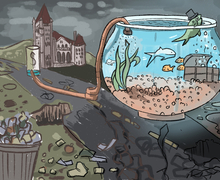Riley: Macklemore’s new song sparks conversation about race
Macklemore’s “White Privilege II” sounds more like a slam poem than a rap song; it’s a mishmash of the rapper’s own experiences and accusations. At times, it is internally raging, and at other times, it is incredibly caustic. The song has created tons of controversy in its short drop period.
The song itself blends strangely, drawing on Macklemore’s time at the Black Lives Matter Seattle rally, his insecurities and his awkwardness about whether or not he belonged. This leads into mimicking a mother and her love of his positive attitude and his discussions of social justice movements. He then calls out Elvis Presley, Miley Cyrus and Iggy Azalea for their appropriation of African-American culture and lashes out that they aren’t improving anything. All this happens between the haunting chorus and the newsreel-style quotes dissing the movement. What the nine-minute song lacks in continuity, it packs an emotional punch.
While some critics of the song argue that Macklemore has yet again taken on the role of “white savior” and that the song lacks artistic merit, others praise it for opening a dialogue on race from a different perspective. They believe that while he might not be fixing the issues that are plaguing the United States, he’s at least bringing attention to them.
Most of the backlash seems to focus on two essential issues. The first is if Cyrus, Azalea and Presley have used cultural appropriation to further their careers, Macklemore seems to have done the same. The second is that it appears Macklemore is capitalizing on the Black Lives Matter movement right before the drop of his newest album for sales.
Looking at Macklemore through the scope of this one song, some of those criticisms may be true. But, when considering his full career and the depth of his songwriting, these negatives don’t seem to be up to snuff. Macklemore is known for both his fun, upbeat songs like “Downtown” and “Thrift Shop,” as well as his commentary on the social aspects of society through the lens of “Same Love” and “Starting Over.”
Macklemore writes from his experiences, and that is reflected all throughout “White Privilege II” as he struggles with both a need to be a part of the Black Lives Matter movement, but also where his place is. Unlike Cyrus, Azalea and Presley, Macklemore has never attempted to steal from African-American culture. In fact, part of the worries surrounding “White Privilege II” say that by rapping he is actually hurting the African-American community through his mimicking of a suburban mother.
Macklemore is releasing the song for free, proving that it’s not really about money. This is the same individual who is famous for refusing Jimmy Iovine through the “rather be a starving artist than succeed at getting f*cked” lyric. He has often supported smaller artists by asking them to sing on his albums. Yes, there is self-hate and insecurity and anger in the lyrics, but that is what makes Macklemore such a great artist. He is not making the movement about himself, but instead trying to bring discussion around an issue he feels passionate about, just like “Same Love.”
Whether you love “White Privilege II” or can’t stand it, it doesn’t matter. Macklemore has already set up what he intended to do, which is start a discussion on race that isn’t based off retweets or likes but instead comes from a place fans are most familiar with — his heart.
Published on January 26, 2016 at 9:48 pm






